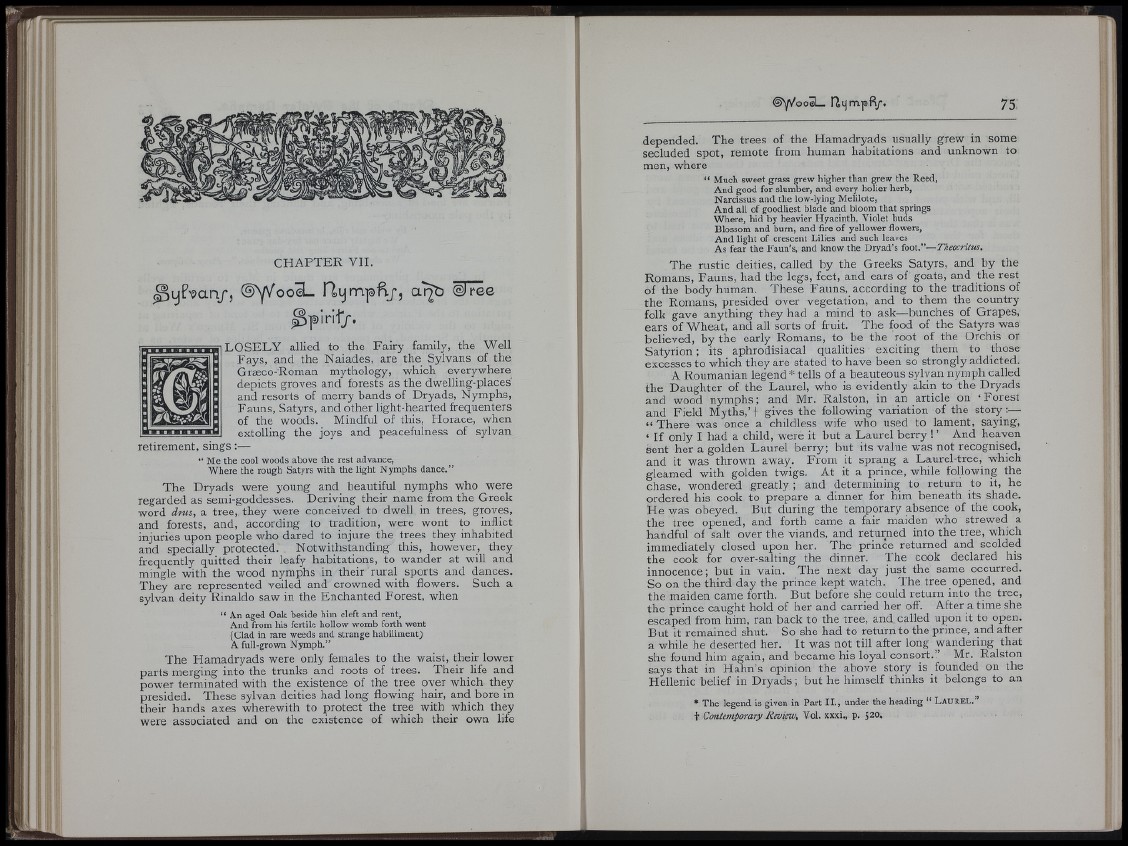
n
■{«
.Ii
" 3 !,
i
I
s
u
■r
4,■
I, ji A
.
n
©y^ooiL. riqmpR/*. 7 5 :
C H A P T E R V II.
y P '^ a n / , © y ^ o o s L R , i jn n .p f i / , a r ^ © T r e e
p l r i l / .
L O S E L Y allied to the Fairy family, the Well
Fays, and the Naiades, are the Sylvans of the
Graeco-Roman mythology, which everywhere
depicts groves and forests as the dwelling-places'
and resorts of merry bands of Dryads, Nymphs,
Fauns, Satyrs, and other light-hearted frequenters
of the woods. Mindful of this, Horace, when
extolling the joys and peacefulness of sylvan
retirement, sings
“ Me the cool woods above the rest advance,
Where the rough Satyrs with the light Nymphs dance.”
The Dryads were young and beautiful nymphs who were
regarded as semi-goddesses. Deriving their name from the Greek
word dfus, a tree, they were conceived to dwell in trees, groves,
and forests, and, according to tradition, were wont to inflict
injuries upon people who dared to injure the trees they inhabited
and specially protected. . Notwithstanding this, however, they
frequently quitted their leafy habitations, to wander at will and
mingle with the wood nymphs in their rural sports and dances.
They are represented veiled and crowned with flowers. Such a
sylvan deity Rinaldo saw in the Enchanted Forest, when
“ An aged Oak beside him cleft and rent.
And from his fertile hollow womb forth went
(Clad in rare weeds and strange habiliment)
A full-grown Nymph.”
The Hamadryads were only females to the waist, their lower
parts merging into the trunks and roots of trees. Their life and
power terminated with the existence of the tree over which they
presided. These sylvan deities had long flowing hair, and bore in
their hands axes wherewith to protect the tree with which they
were associated and on the existence of which their own life
depended. The trees of the Hamadryads usually grew in some
secluded spot, remote from human habitations and unknown to
men, where
“ Much sweet grass grew higher than grew the Reed,
And good for slumber, and every holier herb,
Narcissus and the low-lying Melilote,
And all of goodliest blade and bloom that springs
Where, hid by heavier Hyacinth, Violet buds
Blossom and burn, and fire of yellower flowers,
And light of crescent Lilies and such leaves
A s fear the Faun’s, and know the Dryad’s foot.”— Theocritus.
The rustic deities, called by the Greeks Satyrs, and by the
Romans, Fauns, had the legs, feet, and ears of goats, and the rest
of the body human. These Fauns, according to the traditions of
the Romans, presided over vegetation, and to them the country
folk gave anything they had a mind to ask—bunches of Grapes,
ears of Wheat, and all sorts of fruit. The food of the Satyrs was
believed, by the early Romans, to be the root of the Orchis or
Sa tyrion ; its aphrodisiacal qualities exciting them to those
excesses to which they are stated to have been so strongly addicted.
A Roumanian legend * tells of a beauteous sylvan nymph called
the Daughter of the Laurel, who is evidently akin to the Dryads
and wood nymphs; and Mr. Ralston, in an article on ‘ Forest
and Field Myths,’ ! gives the following variation of the story:—
“ There was once a childless wife who used to lament, saying,
‘ I f only I had a child, were it but a Laurel berry ! ’ And heaven
sent her a golden Laurel berry; but its value was not recognised,
and it was thrown away. From it sprang a Laurel-tree, which
gleamed with golden twigs. At it a prince, while following the
chase, wondered g re a tly ; and determining to return to it, he
ordered his cook to prepare a dinner for him beneath its shade.
He was obeyed. But during the temporary absence of the cook,
the tree opened, and forth came a fair maiden who strewed a
handful of salt over the viands, and returned into the tree, which
immediately closed upon her. The prince returned and scolded
the cook for over-salting the dinner. The cook declared his
innocence; but in vain. The next day just the same occurred.
So on the third day the prince kept watch. The tree opened, and
the maiden came forth. But before she could return into the tree,
the prince caught hold of her and carried her off. After a time she
escaped from him, ran back to the tree, and called upon it to open.
But it remained shut. So she had to return to the prince, and after
a while he deserted her. It was not till after long wandering that
she found him again, and became his loyal consort.” Mr. Ralston
says that in Hahn’s opinion the above story is founded on the
Hellenic belief in Dry ads; but he himself thinks it belongs to an
* The legend is given in Part I I ., under the heading “ L a u r e l . ”
t Contemporary Revie%if^ Vol. xxxi., p. 520,
1 al